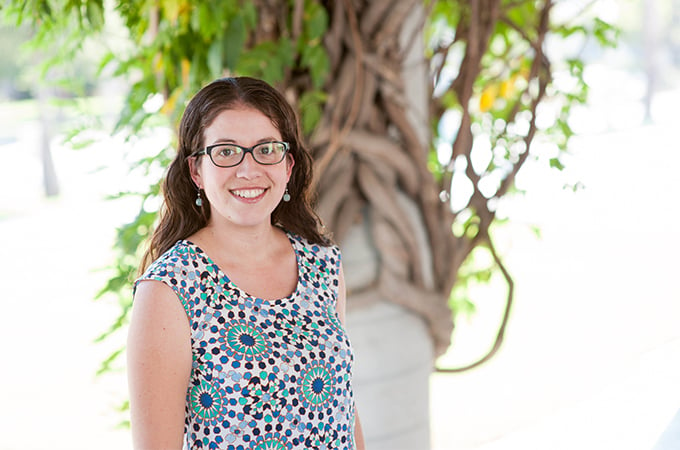“I didn’t even realize that becoming a professor was an option for me,” says School of Education Professor Adriana Ruiz Alvarado. Originally from Los Angeles, Alvarado attended University of California, Berkeley, with the intention of studying journalism.
While an undergraduate student, Alvarado came to a crossroads. “My involvement in on-campus groups and organizations at UC Berkeley piqued my interest in higher education,” she says. “Since Berkeley didn’t have an education major, I picked a major that was most closely related to education, which was social welfare.”
Alvarado had initially planned to become an elementary school teacher. But after working as an undergraduate academic advisor at the University of California, Los Angeles Department of Spanish and Portuguese, she changed her mind. “I was around a lot of faculty members and students who were in graduate school, and I realized that I could continue my own education,” says Alvarado.
Alvarado remembers wanting to attend college throughout her childhood, due to her parents’ constant encouragement. “My parents instilled in me the idea that education was really important and that it would influence my future,” she says. “Going to college was something they always wanted to do but weren’t able to. They were both immigrants, so they just didn’t have the resources to further their education.”
Alvarado was an undergraduate student when the DREAM Act (Development, Relief, and Education for Alien Minors Act, providing a path for citizenship for those brought to the United States as children) was first proposed in the U.S. Senate. “Since then, I have seen close friends and my own students have their hopes shattered every time it has failed to become federal legislation,” she says. “I believed then and believe even more strongly now that a bipartisan agreement needs to be reached because DACA [Deferred Action for Childhood Arrivals] students deserve a solution. How we can support them without one is an important issue in higher education.”
The transition from high school to college was difficult as a first-generation college student, Alvarado recalls. “Being away from home and navigating the campus both academically and socially was really hard for me,” she says. “Because UC Berkeley was so large, it was hard to find my place at first.”
Once Alvarado became involved in different clubs and programs in college, though, she began to feel comfortable. “I was so fortunate to feel like I belonged,” she says. “There were some organizations I was a part of for all four years of undergrad that helped me find my career path, and, through them, I created life-long friendships.”
When asked if she has any advice for current first-generation college students, Alvarado encourages students to believe in themselves. “First-generation students should know that they belong on campus,” she says. “I hope they take advantage of everything available to them, whether it be going to office hours, connecting with programs and clubs, or building relationships with faculty. Those things really help.”
Are you ready to take the next step toward earning your M.A. in Higher Education? Tell us more about your educational interests and receive more information today.






